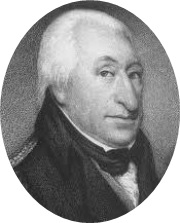Tandy's political philosophy was greatly influenced by Dr Charles Lucas, a Co. Clare born political activist, who campaigned for Dublin Corporation reform, Irish legislative independence, and, later for the Republican separatism policy championed by the United Irishmen.
In 1777 Tandy was elected to the Dublin Corporation as a representative of the Merchants Guild. He continued to serve in that capacity for eighteen years. He was an outspoken critic of the systemic corruption he encountered within the Corporation and actively campaigned for its' reform. As a serving member of the Corporation he introduced a resolution of support for the American colonists during the American Revolutionary War.
In 1779 he spearheaded another resolution to boycott English goods in retaliation for the draconian restrictions imposed on Irish trade In 1785 he vigorously opposed the amended commercial propositions put forth by the British government and spearheaded a set of Corporation resolutions condemning them. These anti-British actions exposed him the contempt and derision of the British establishment and put him under the watchful eye of the British authorities in Ireland. On the other hand, his fearless denunciation of corruption and cronyism and the British governments repressive colonial policies made him a popular and respected figure amongst the enlightened citizens of Dublin.
Tandy was involved in a number of organization including the Irish Volunteers. The Irish Volunteers consisted of local militias organized independent of British government control purportedly to guard against Spaniards or French invasion when regular British soldiers were dispatched to fight the Americans during the American Revolutionary War.
Although most of the volunteers were Protestants their loyalty to the British Crown was tempered by their resentment of Britain's trade policies towards Ireland and the Poynings Laws that rendered the Irish Parliament a vassal of the British parliament. A vocal minority within the Volunteers, included Tandy, also, opposed the repressive Penal Laws promulgated by the British parliament to protect the Protestant Ascendency. Edmund Burke described to Penal Laws that stripped Catholics and Dissenters of all fundamental rights as; a machine of wise and elaborate contrivance, as well fitted for the oppression, impoverishment and degradation of a people, and the debasement in them of human nature itself, as ever proceeded from the perverted ingenuity of man.”
Tandy enlisted in the Dublin regiment of the Volunteers in 1778 and was put in command of artillery. After a failed attempt by Tandy to remove the Duke of Leinster from command of the regiment he resigned and shortly afterwards joined the Irish Brigade of the Dublin Independent Volunteers.
Seizing on the weakened British military presence in Ireland the Volunteers pressured the British government to liberalize their trading policies with Ireland and grant legislative independence to the Irish Parliament.
In November of 1791 Tandy helped Theobald Wolfe Tone establish a Dublin branch of the Society of the United Irishmen, a predominately Protestant organization. The Society was first established in Belfast, a month earlier, on October 14. The following resolutions were adopted at that meeting:
-
That the weight of English influence in the Government of this country is so great as to require a cordial union among all the people of Ireland, to maintain that balance which is essential to the preservation of our liberties and the extension of our commerce
-
That the sole constitutional mode by which this influence can be opposed is by a complete and radical reform of the people in Parliament
-
That no reform is just which does not include Irishmen of every religious persuasion.
In 1792 Tandy joined the 'Defenders' a secret Catholic agrarian organization set-up to defend Catholics against the Protestant "Peep O'Day Boys", a precursor organization to the present-day Orange Order. His reason for joining was to forge an alliance between the Defenders and the Society of United Irishmen .
In 1793, motivated by the American and French revolutions, the Society became more militant and started planning for insurrection. Tandy, together with Archibald Hamilton Rowan and others raised two military battalions in Dublin modeled after the French National Guards whose members espoused Republican principles and displayed on their uniform the cap of liberty instead of the crown surmounted the Irish harp.
After the outbreak of hostilities between Britain and France in February of 1793 the Society was outlawed and, as a consequence, became an oath bound secret organization, who by this time, was wholly committed to "breaking the connection wit England". Shortly afterwards proceedings were initiated against Tandy for distributing a seditious pamphlet entitled Common Sense, and for consorting with the Defenders. Aware of his immanent arrest and possible execution he fled to America.
After arriving in America he spent time in Philadelphia and Boston before settling in Wilmington, Delaware where he remained until his departure for France in 1798. During his years in America he worked for the Society of United Irishmen mostly lobbying French diplomats in Philadelphia, (the US Capital at that time) for French military assistance in support of Ireland's fight for freedom against their common enemy, the British.
In 1797 conditions in Ireland were rapidly approaching the breaking point. Crown forces and Loyalist yeomanry were on a rampage; the country was teetering on war. Aware of the dire situation in Ireland Tandy departed for France in the spring of 1798 to offer his services to the French who were offering their support to the United Irishmen in their fight for an Irish Republic. Upon arrival he joined the French army, was granted the rank of General and assigned to the renowned Irish-born General Charles Edward Jennings de Kilmaine, who together with Wolfe Tone was in the final planning stages for an invasion of Ireland.
As part of the invasion force Tandy set sail for Ireland in early on the frigate, Anacreon, with a contingent of exiled United Irishmen, arms and ammunition. On September 16, 1798 Tandy and his men landed on Rutland Island off the Donegal coast to learn, to his dismay, of General Humbert's defeat at the Battle of Ballinamuck a week earlier on September the 8th.
Realizing that any further action was futile Tandy re-embarked and sailed north to Norway to avoid British warships. On his back to France he was arrested and imprisoned in Hamburg before been turned over to the British. He was returned to Dublin where he was tried for complicity in the Rebellion of 1798. He was acquitted of that charge on a technicality. He was tried a second time in Lifford in Co. Donegal in April of 1801 for his part in the attempted invasion. He was found guilty and sentenced to death.
His life was spared when Napoleon Bonaparte refused to sign the Treaty of Amiens until Tandy was released. The British conceded and Tandy was set free in in March of 1802. The Treaty of Amiens temporarily ended hostilities between France and England.
Tandy returned to France where he was received as "a person of distinction" and awarded a full General's pension.
He died in Bordeaux on August 24, 1803. His was given a full military funeral that was attended by local dignitaries and a large entourage of local people.
Unconfirmed accounts have it that his body was secretly returned and buried in the churchyard of the Castlebellingham Parish Church in Co. Louth.
Contributed by; Tomás Ó Coısdealbha

 James Napper Tandy was born in the Cornmarket area of Dublin in
1740, one of three children born
to James Tandy, an iron works
merchant,
and wife, Maria Bella Jenkins.
James Napper Tandy was born in the Cornmarket area of Dublin in
1740, one of three children born
to James Tandy, an iron works
merchant,
and wife, Maria Bella Jenkins.
